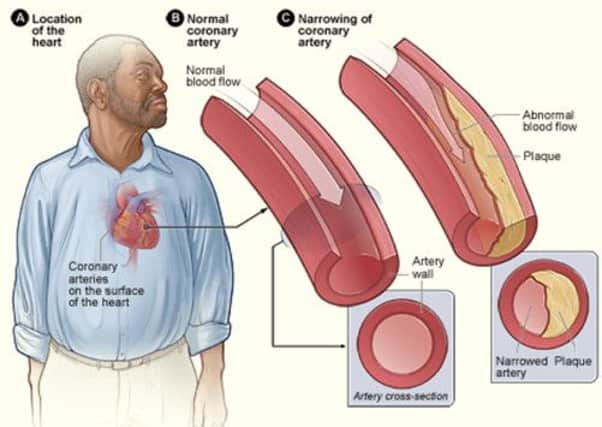New Scots heart attack approach could save lives


A study involving doctors at the Golden Jubilee National Hospital in Clydebank found that carrying out extra procedures to unblock narrowed veins could significantly reduce the risk of further heart problems and death.
They hope that extra research will now help convince medics worldwide to change the way they treat heart attack patients to improve their chances of long-term survival.
Advertisement
Hide AdAdvertisement
Hide AdEvery year 25,000 people in the UK have a heart attack which is treated with a procedure known as an angioplasty to widen the narrowed artery which caused them to become ill.
A long, flexible plastic tube called a catheter is inserted into a blood vessel, either in the groin or arm, and then guided to the artery, which is narrowed by a build-up of fatty deposits.
A short wire-meshed tube - known as a stent - is put in place to keep the artery open, using a small balloon which is inflated to stretch it to fill the opening.
But currently medical guidelines state that only the artery that caused the heart attack should be treated during the initial procedure.
In the latest study, published in the New England Journal of Medicine, doctors also tested whether other arteries could be widened at the same time to reduce the risks to patients.
A total of 465 patients were recruited between 2008 and 2013 in specialist heart centres across the UK, including sites in London, Norwich and Newcastle as well as the Golden Jubilee.
Half the patients had a stent placed only in one artery, as is standard practice, while the other half had stents placed in all the arteries which were found to be narrowed.
The study concluded that patients who had stents placed in their other narrowed arteries at the same time as the one that triggered the heart attack were 64 per cent less likely to die, suffer another serious heart attack or have severe angina over the next two years.
Advertisement
Hide AdAdvertisement
Hide AdThe results of the trial were so significant that it was stopped early so the benefits could be reported.
Researcher Professor Colin Berry, from the University of Glasgow, said around half the patients who underwent an angioplasty also had significant narrowings in other arteries which could cause another heart attack in the future.
But he said previous research had suggested doing extra procedures at the same time might cause harm, and there had been no large previous studies which showed that multiple angioplasties were beneficial.
In some cases, doctors may have done extra procedures at a later date, but the international guidelines were just to deal one artery in the initial treatment.
Prof Berry said as a result of the findings a meeting would take place at the Golden Jubilee to discuss the research to consider how they could implement the results.
“That will be the response in our hospital and I think it is for other hospitals to consider the trial results and how they might respond,” he said.
New trials are planned, including at the Golden Jubilee, to increase the evidence available to change guidance worldwide.
Prof Berry said the new approach to treating narrowed arteries would increase costs for the NHS.
Advertisement
Hide AdAdvertisement
Hide AdBut he added: “What the trial has shown is an improvement in survival in respect of cardiac problems, a reduction in future heart attacks and reducing the risk of severe angina necessitating hospital admission.
“So by implementing the results of the trial one would anticipate savings to the health service and society as a whole.”
David Clark, chief executive of Chest Heart & Stroke Scotland, said: “Survival rates for heart attack patients have improved significantly since the widespread introduction of immediate angioplasty treatment which opens blocked coronary arteries.
“This study shows that even better outcomes might be possible, and hundreds more lives saved in Scotland every year.”